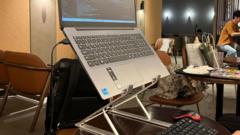In the bustling neighborhood of Daechi, Seoul, cafe owner Hyun Sung-joo finds himself facing an unexpected dilemma with the rise of 'Cagongjok,' a term for young South Koreans who prefer to study or work in coffee shops for extended hours. One recent incident prompted him to block off power outlets after a customer arrived with two laptops and a six-port power strip to support their all-day work session.
This trend has become a cultural fixture in South Korea, particularly among students and office workers, and is more prominent than in many Western nations. Starbucks Korea recently announced it is tackling particularly disruptive cases of users bringing bulky equipment—such as desktop monitors and printers—into their stores. They emphasized that while staff won't ask customers to leave, they will offer guidance to ensure a comfortable environment for everyone, especially considering past thefts of unattended belongings.
Despite the new measures, many moderate Cagongjok continue to find cafes like Starbucks appealing. On a typical Thursday evening, the ambiance at a Starbucks in Gangnam is quiet, with students absorbed in their work, including an 18-year-old preparing for the critical university entrance exam, Suneung. She mentioned how she often spends nearly 11 hours at the cafe, sometimes leaving her belongings unattended as she grabs a meal nearby.
Since the guidelines took effect on August 7, changes have been subtle. Starbucks told the BBC it's challenging to assess the impact of these measures. Public reactions are mixed; some applaud the move as a necessary adjustment to restore regular cafe usage, while others view the restrictions as excessive, marking a departure from the chain's previously laid-back policy.
The Cagongjok phenomenon echoes wider societal dynamics in South Korea, especially with a burgeoning coffee shop culture that saw a nearly 50% increase in establishments in recent years. A survey found that 70% of Gen Z job seekers study in cafes at least once a week, illustrating how ingrained the practice has become.
Many cafe owners grapple with the issue in various ways. Hyun finds that most customers are considerate and occasional long-term users often make extra purchases. However, he acknowledges that some have taken it too far. Contrast this with Kim, an anonymous cafe owner who implemented a "No Study Zone" after patrons monopolized space, restricting usage to two hours to prevent conflicts.
As for the reasons behind the preference for cafes over libraries or homes, the emotional significance of these spaces plays a critical role. Yu-jin Mo, who grew up in foster care, describes cafes as a vital refuge where she feels secure and less isolated.
Professor Choi Ra-young from Ansan University has noted that Cagongjok is a cultural product of South Korea's hyper-competitive society, driven by academic pressures and inadequate public study spaces. She advocates for the establishment of more inclusive environments that cater to this demographic, suggesting the need for guidelines that allow studying in cafes without inconveniencing other customers.
Overall, as South Korean cafes adapt to this growing trend, the challenge remains to strike a balance that benefits both those seeking a workspace and those looking to enjoy a social atmosphere.

















